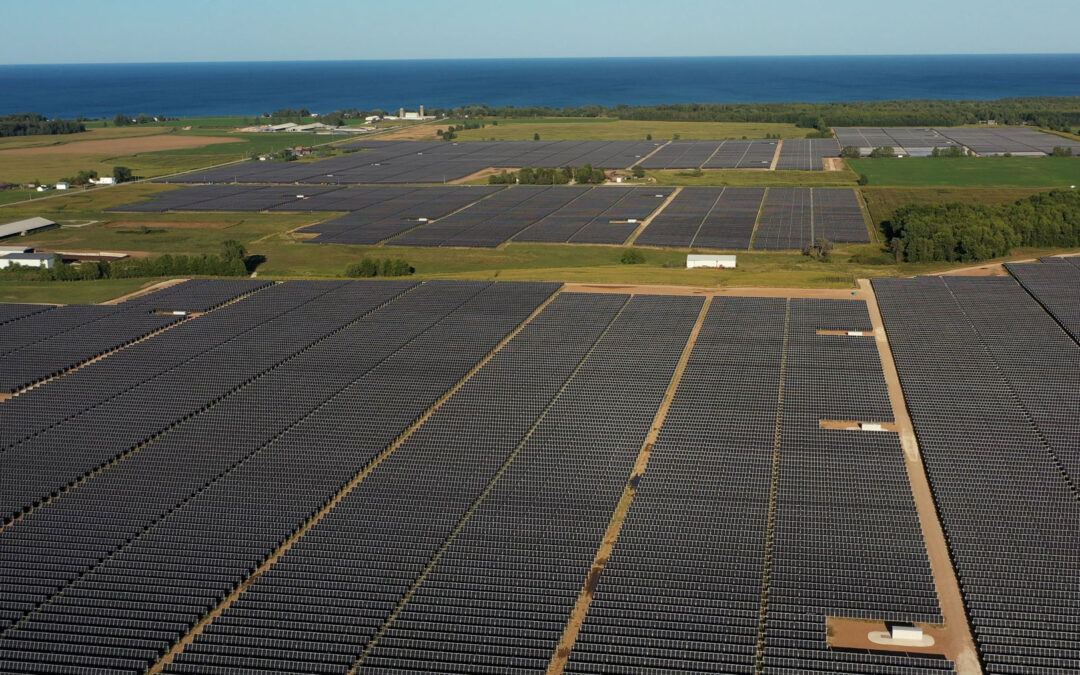
by Michael Vickerman | Nov 15, 2020 | Public Service Commission, Renewables, Solar, Utilities, Utility Scale
The Two Creeks Solar Park, located in Manitowoc County, was energized last week, becoming the state’s largest generating station powered by the sun. Developed by Florida-based NextEra Energy, Two Creeks is jointly owned by two Wisconsin electric utilities: Wisconsin Public Service Corporation (WPS) and Madison Gas and Electric (MGE). WPS owns and operates a 100 megawatt (MW) share of the 150 MW power plant, while MGE has the remaining 50 MW share.
Located next to the Point Beach Nuclear Plant, Two Creeks effectively doubles the amount of solar generating capacity in Wisconsin to 300 MW, and will, over the next six months, produce more electricity than the combined output from all other existing solar systems in Wisconsin. Expected to produce more than 300,000,000 megawatt-hours a year, Two Creeks will generate about one-half of one percent of the state’s overall supply of electricity, which is the equivalent of what 33,000 residences consume annually.
Along with the 300 MW Badger Hollow Solar Farm in Iowa County, Two Creeks received approval from the Public Service Commission (PSC) in April 2019. These two were the pioneering solar farm proposals that navigated through the PSC’s power plant siting process and won approval from the agency. At the same meeting, the PSC granted a joint request from WPS and MGE to acquire Two Creeks.
Since then, the PSC has given the green light to two more solar farms totaling 249 MW in capacity, including NextEra Energy’s 100 MW Point Beach Solar Farm next door to Two Creeks. Point Beach Solar is under construction and should be completed in the fall of 2021.
Construction work on Two Creeks commenced on August 2019, kicked off with a groundbreaking ceremony that drew Gov. Tony Evers and the two utility ceos. Governor Evers’ appearance came less than a week after he issued Executive Order 38, articulating a goal of “ensuring all electricity consumed within the State of Wisconsin is 100% carbon-free by 2050.”
Building Two Creeks was no small undertaking. It involved punching thousands of posts into the ground to support horizontal tracking systems spreading across 800 acres of relatively flat terrain. Mounted on these rotating poles are more than 500,000 panels that follow the sun as it crosses the sky going east to west. Between the first rays of sunlight and the last ones before sunset, these panels soak in the sunshine and convert it to electricity.
A plant like Two Creeks will begin displacing higher-cost power at the moment it is energized, and these savings will grow significantly over the course of its 30-to-50-year life. True, the utilities will need to recover the cost of building the solar farm, somewhere in the vicinity of $195 million. But the savings utilities expect to reap from avoided fossil fuel purchases and pollution control expenditures will more than outweigh their investment in a zero-carbon generation source. Seen in this light, large-scale solar is indisputably the most cost-effective supply option that an electric utility can pursue going forward.
The benefits from Two Creeks extend beyond ratepayer savings. Manitowoc County and the Town of Two Creeks, the jurisdictions hosting the solar farm, expect to reap a combined $600,000 in local aids each year while the project remains in service. That number grows to $18,000,000 over the course of 30 years, which is the projected minimum lifespan of Two Creeks.
Solar is a noncombustible energy resource that does not emit any gaseous emissions or particulates when converted to electricity. Deploying solar at the scale of Two Creeks will capture significant public health and air quality benefits by avoiding emissions that are associated with conventional fossil generation plants. In another PSC proceeding involving a 15O MW solar farm in eastern Wisconsin, the developer anticipates annual emissions reductions in the following categories of pollutants: (1) nitrogen oxide (NOx) emissions by 195,000 pounds; (2) methane (CH4) by 20,000 pounds; (3) nitrous oxide (N2O) by 5,000 pounds; and (4) carbon dioxide (CO2) by 405 million pounds.
Decarbonizing the state’s fleet of power plants is also a job creation strategy. The PSC estimates that somewhere between 200 and 300 jobs were created during the project’s construction window. It’s quite likely that many of the workers involved in the building of Two Creeks are now hard at work constructing the adjoining Point Beach solar farm.
In the annals of Wisconsin electric utility history, Two Creeks represents a noteworthy milestone, as the first solar farm to clear the PSC’s power plant review process and become a valuable addition to the state’s portfolio of power plants. And it took only 18+ months from the crossing of the regulatory finish line for Two Creeks to start sending power into the grid.
Two Creeks can also be viewed as the lead entry in a parade of large solar farms seeking to cross the same regulatory finish line and proceed to construction and completion. Looking out over the next 12 months, the PSC will review and make decisions on six solar farm applications totaling 1,150 MW (see table below).
| Project name |
Developer |
County |
Capacity
(in MW) |
Anticipated decision date |
| Paris |
Invenergy |
Kenosha |
200 |
11/2020 |
| Wood County |
Savion |
Wood |
150 |
12/2020 |
| Grant County |
NextEra Energy |
Grant |
200 |
4/2021 |
| Onion River |
Ranger Power |
Sheboygan |
150 |
5/2021 |
| Darien |
Invenergy |
Walworth/
Rock |
250 |
7/2021 |
| Apple River |
National Grid |
Polk |
100 |
9/2021 |
| Springfield |
National Grid |
Dodge |
100 |
9/2021 |
Within that same 12-month window, we expect two more PSC-approved solar farms—Badger Hollow I (150 MW) and Point Beach (100 MW) to cross the finish line and begin generating electricity.
What we’re seeing here is the emergence of a new resource paradigm that is ushering in a major wave of public works construction across the state. As this transition unfolds, solar power will become widely recognized as a linchpin in the state’s economy, extending through this decade and beyond.
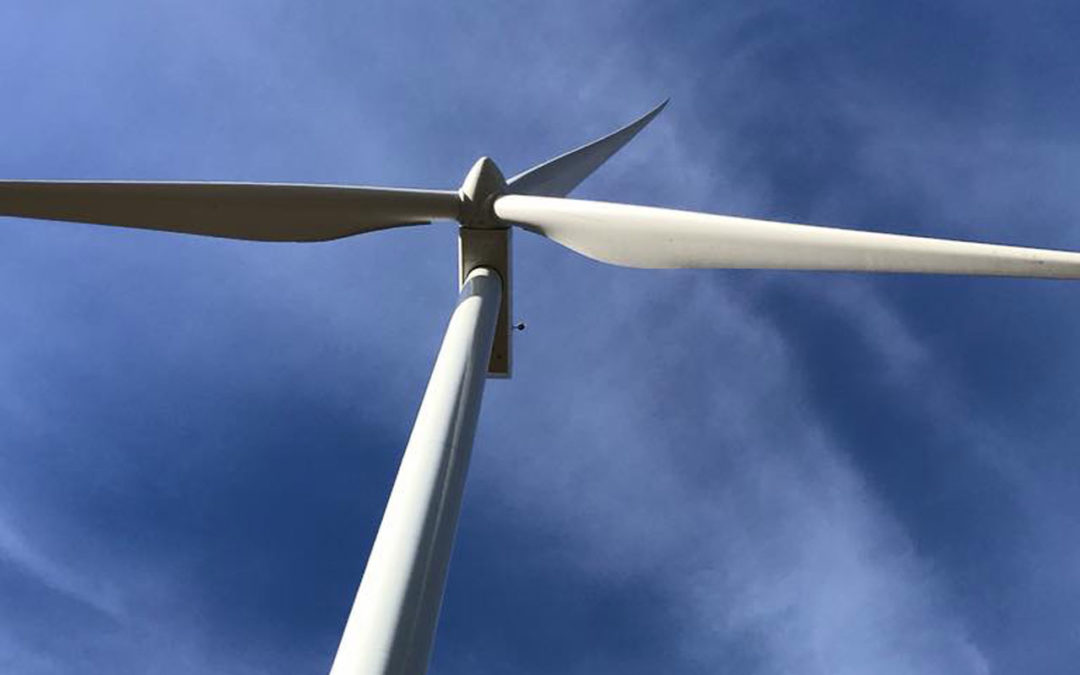
by Michael Vickerman | Jun 16, 2020 | Public Service Commission, Renewables, Utility Scale, Wind
In the first-ever test of the appeal process set forth in Wisconsin’s Wind Siting Rule (PSC 128), the Public Service Commission (PSC) reviewed and upheld Green County’s approval last fall of a 24-turbine, 65-megawatt (MW) wind project slated for development there. Following the county’s original decision, local wind farm opponents petitioned the PSC to invalidate the project’s permit, contending that the developer’s application was incomplete.
On June 11, the PSC denied the petition on a 3-0 vote, and in so doing removed the last remaining legal obstacle from the project’s path. As it stands today, the Sugar River wind farm is fully compliant with the standards set forth in the statewide rule relating to public health and safety, and may now proceed to construction.
Advanced by EDF Renewables, a nationally prominent renewable energy producer, Sugar River is capable of generating enough electricity to equal the consumption of 20,000 Wisconsin households. When operational, Sugar River will also yield about $260,000 in annual revenues, with nearly $152,000 going to Green County and more than $108,000 to the Town of Jefferson. Before ground can be broken, however, EDF will need to either sign a power purchase agreement with an off-taker or agree to sell the wind farm to an electric provider when construction is complete.
Sugar River was one of the first two wind energy proposals in 2019 to go through the local government review process specified in PSC 128. The other proposed wind farm, the 99 MW Red Barn project in Grant County, secured a conditional use permit in July 2019. No appeal of Grant County’s decision was filed. Like Sugar River, Red Barn is expecting to begin operation in the second half of 2021, assuming a partnership has been forged with an electric provider.
Sugar River provided the first significant test of PSC 128 after the rule narrowly survived a repeal vote during the 2011-2012 legislative session. The rule establishes a mechanism whereby a citizen group or a development company may challenge a local government decision on a proposed wind farm. Under this appeal process, the PSC’s role is to ascertain whether the local government adhered to all the standards and procedures in rendering a decision on a wind farm proposal.
In the case of Sugar River, the PSC agreed to take up the appeal filed by No Green County Wind in October 2019. Before rendering its decision, the PSC invited interested parties to submit comments on the matter. In its comments, RENEW expressed its support for the Sugar River project, as well as the regulatory framework that allowed the project to be given a fair hearing at every step of its permitting journey. The PSC plans to issue a written decision in July.
The approvals of Sugar River and Red Barn signal the end of a protracted lull in wind development activity lasting from 2011 to 2017. Between an adverse political environment and a glut of generating capacity, wind energy development stalled in Wisconsin. During the dry spell here, developers flocked to greener pastures in neighboring states. The door reopened slightly when Dairyland Power Cooperative agreed to purchase electricity generated from Quilt Block Wind Farm, which started operating in November 2017.
Though local opposition to wind development remains very much alive today, the experience with Sugar River attests to the strength and durability of Wisconsin’s Wind Siting Rule, which foretokens brighter days for the wind power industry here.
To learn more about the Sugar River Wind Farm, visit these previous blog posts.
PSC affirms local approval of Sugar River Wind Farm
Local Residents Discuss Wind Energy in Wisconsin
A Scientific Look into Wind Power and Human Health
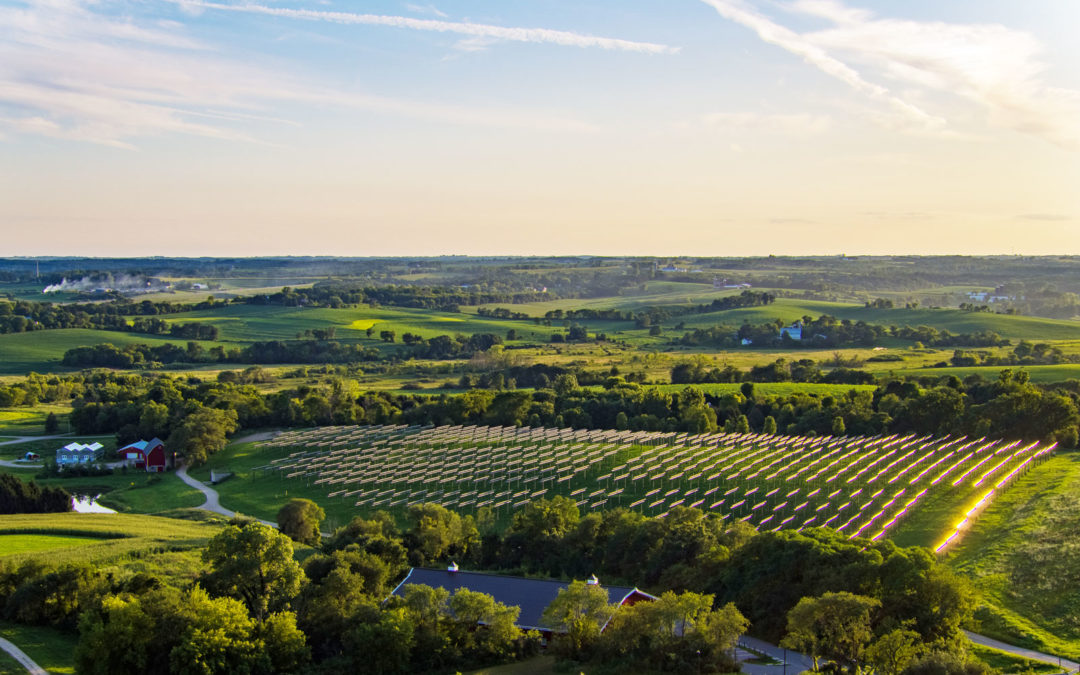
by Heather Allen | Apr 1, 2020 | Advocacy, Public Service Commission, Solar, Utility Scale
Amid our current health and economic challenges, the solar industry is committed to investing in local communities, creating jobs, and increasing tax revenues with clean, homegrown energy. Large scale solar projects are currently being built in Wisconsin and new projects are on the horizon, ready to contribute to Wisconsin’s energy mix! In order to ensure success, we need you to help a critical project win approval at the Public Service Commission.
The Paris Solar Energy Center is a 200 megawatt project proposed in Kenosha County, Wisconsin. The project will supply homegrown, affordable, emission-free electricity to 55,000 homes. If approved, the Paris Solar Energy Center would more than double the solar generating capacity we have operating in Wisconsin today. Paris Solar would begin producing clean power by 2022. Want to learn more? Check out the application here.
Help us demonstrate Wisconsin’s enthusiastic support for this project and renewable energy.
RENEW Wisconsin will share the list of supporters with the Public Service Commission during the official comment period for this project.
Please add your name to our petition!
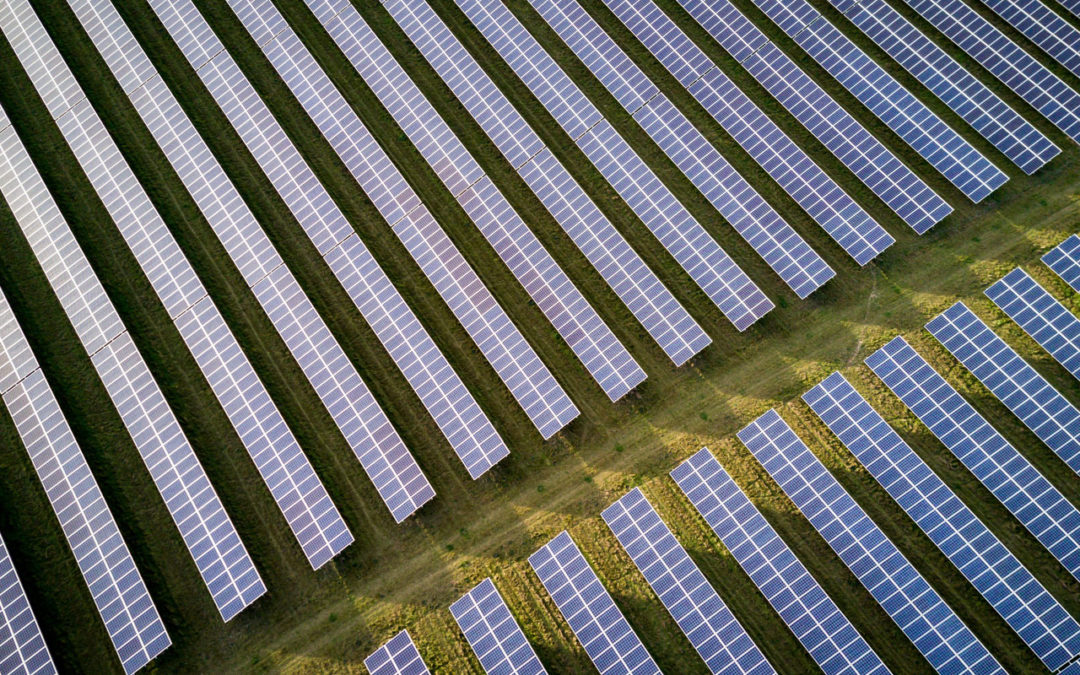
by Michael Vickerman | Feb 20, 2020 | Public Service Commission, Renewables, Solar, Utilities, Utility Scale
The Public Service Commission today cleared the path for the Badger Hollow solar farm to become a utility-owned generating asset in its entirety. Approved in April 2019 and now under construction, the 300 megawatt (MW) plant in western Iowa County will soon be co-owned by a third utility, Milwaukee-based Wisconsin Electric Power Company (WEPCO). Chicago-based Invenergy is the developer for Badger Hollow and will oversee the construction process until its completion in 2021
As a result of today’s action, WEPCO and Madison Gas and Electric (MGE) will jointly acquire a 150 megawatt share of this facility, which should start sending power into the grid by the end of 2020. Shares of the 300 MW solar farm will be divided equally between WEPCO, MGE, and Green Bay-based Wisconsin Public Service.
After reviewing the applicants’ filings, the PSC determined that both MGE and WEPCO need new generating capacity in the near future, and that this 150 MW increment of Badger Hollow would be part of the least-cost expansion plan for both utilities.
RENEW submitted a letter of support for the acquisition, as did the cities of Milwaukee and Madison. Calling attention to the state’s clean energy goals as well as those of the two cities and the utilities that serve them, our comments emphasized the economic and environmental value that Badger Hollow will yield to utility customers as well as to project participants, host communities, and the state as a whole.
The PSC’s approval effectively brings the first chapter of utility-scale solar development in Wisconsin to a close. Since June 2018, the PSC has reviewed four proposals to build nearly 700 MW of in-state renewable generating capacity, and gave the green light to all of them. The following table summarizes these projects and their relationships to Wisconsin electricity providers.
| Project |
Capacity (in MW) |
Developer |
Utility participant(s) |
Location (by county) |
| Badger Hollow |
300 |
Invenergy |
WEPCO (100 MW)
MGE (100 MW)
WPS (100 MW) |
Iowa |
| Two Creeks |
150 |
NextEra Energy |
WPS (100 MW)
MGE (50 MW |
Manitowoc |
| Point Beach |
100 |
NextEra Energy |
WPPI Energy |
Manitowoc |
| Badger State Solar |
149 |
Ranger Power |
Dairyland Power Cooperative |
Jefferson |
The next wave of solar farms will begin washing through the state regulatory review process this spring. The first one out of the gate is the Paris Solar Farm, located in Kenosha County. Invenergy’s application to build the 200 MW solar farm was submitted yesterday. Dockets have been opened for several other prospects in Wisconsin. Listed below are the solar farm projects that we anticipate will be reviewed by the PSC this year.
| Project |
Capacity (in MW) |
Developer |
Location (by county) |
Docket number |
| Paris |
200 |
Invenergy |
Kenosha |
9801-CE-100 |
| Grant County |
200 |
NextEra Energy |
Grant |
9804-CE-100 |
| Wood County |
150 |
Savion Energy |
Wood |
9803-CE-100 |
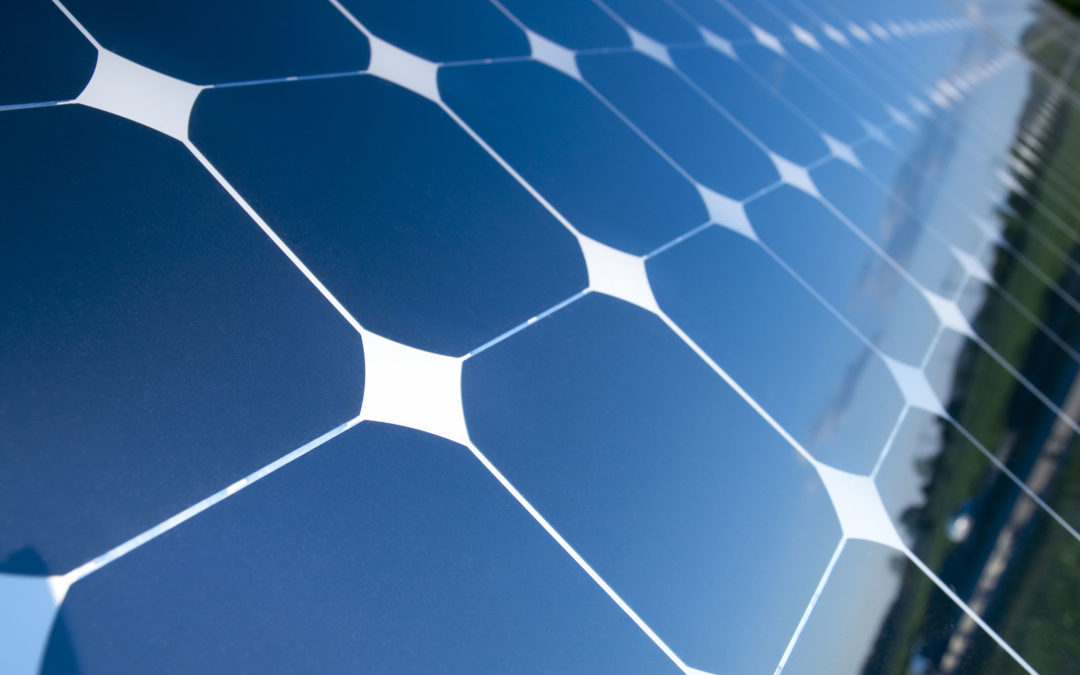
by Tyler Huebner | Jan 30, 2020 | Local Government, Public Service Commission, Solar, Utilities, Utility Scale
Today, the Public Service Commission of Wisconsin approved another solar farm: the Badger State Solar Farm to be located in Jefferson County, Wisconsin.
Badger State will be a 149-megawatt solar farm, and will supply electricity to Dairyland Power Cooperative. Dairyland is a wholesale energy provider for 24 rural electric cooperatives, 18 of which are located in Wisconsin. Dairyland also provides energy to an additional seventeen municipal electric utilities, ten of which are in Wisconsin.
The solar project’s developer is Ranger Power, one of RENEW Wisconsin’s Business Members.
This project marks the fourth solar farm approved by the Wisconsin PSC in the past 9 months, and the solar projects approved now total 699 megawatts. Badger State should be operational by 2021.
The project is expected to generate enough renewable energy to power over 20,000 homes, according to a Dairyland Power news release from March 2019, when their power purchase agreement was announced.
The project was given a unanimous verbal approval today, and a final order will follow in the next few weeks. This was the final decision made by retiring Commissioner Mike Huebsch, who announced his retirement earlier this month.
RENEW Wisconsin’s Executive Director Tyler Huebner said, “The Badger State Solar will continue Wisconsin’s steady march towards a clean, renewable energy future, and will help Dairyland Power Cooperative meet its goals to increase the sustainability and diversity of its power generation sources. Congratulations to Ranger Power and Dairyland Power Cooperative on this project approval!”
Statistics about the Badger State Solar Farm
- 149 megawatts
- Expected to produce enough electricity for about 20,000 Dairyland Power Cooperative customers each year
- Electricity Production will be about 0.4% of Wisconsin’s total 2018 electricity sales, and about 8% of Dairyland Power’s 2018 Wisconsin retail sales.
- Located on approximately 1,200 acres which is 0.5% of Jefferson County’s farmland
- The project developer expects to utilize pollinator-friendly plants under the solar panels that will help rejuvenate the soil underneath the array.
- Under Wisconsin’s energy generation shared revenue law and renewable energy incentive payment laws, the local governments where the arrays are located will receive a substantial economic boost: Jefferson County will receive approximately $348,000 annually, the Town of Jefferson $125,000 annually, and the Town of Oakland $123,000 annually.
Statistics about the 4 solar farms approved by the PSC
Badger Hollow Solar (Iowa County), Two Creeks Solar (Manitowoc & Kewaunee Counties), Point Beach Solar (Manitowoc County), and now Badger State Solar (Jefferson County) received PSC approvals between April 2019 and January 2020.
- Total of 699 megawatts of solar power production
- Expected to produce enough power for about 178,000 average Wisconsin homes’ annual energy consumption
- This amount of electricity produced would be about 2.0% of Wisconsin’s total 2018 electricity sales
- These four projects will be located on approximately 5,300 acres of land, about 0.05% of Wisconsin’s farmland. In total Wisconsin has approximately 34,700,000 acres of land.
- The hosting local governments (townships and counties) will receive $2,796,000 annually once these four projects are operational.

by Tyler Huebner | Dec 19, 2019 | Public Service Commission, Renewables, Solar, Utilities, Utility Scale
Today, the Public Service Commission of Wisconsin approved the Point Beach Solar Farm project!
Point Beach will be a 100 megawatt solar farm, and will supply electricity to WPPI Energy. WPPI is a wholesale energy provider for 41 municipal utilities in Wisconsin plus 10 more across Michigan and Iowa. The developer is NextEra Energy Resources, one of RENEW Wisconsin’s newest Business Members.
Almost three years ago, WPPI Energy made a splash by announcing the results of a request for renewable power proposals. At the time, wind energy was expected to be the winner of that competition. But this solar farm proposal was selected, foreshadowing how cost-effective solar power was becoming in Wisconsin.
Since then, other major power suppliers have followed WPPI Energy’s lead. In April 2019, the PSC approved the Badger Hollow and Two Creeks Solar Farms. Along with the 49.9 megawatt Richland County Solar Farms which was approved at the County level, these projects marked the first utility-scale solar approvals in Wisconsin.
This Point Beach Solar Farm will be placed on ground right around the existing Point Beach Nuclear Energy plant. It will also be located next to the Two Creeks Solar Farm now in construction, with the two projects combining to provide 249 megawatts of solar capacity in Manitowoc County.
With today’s PSC approval in hand, construction will begin next year and it should come online in 2021. It is expected to provide enough energy to serve more than 23,000 people.
Congratulations to NextEra Energy Resources and WPPI Energy on this project approval!





